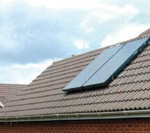 The man behind the Money Saving Expert website, Martin Lewis, has featured on this afternoon’s Jeremy Vine show on BBC Radio2 as part of a discussion about the benefits of domestic solar PV (Photovoltaic) panel installations and the payments received through the Feed-in Tariff (FIT).
The man behind the Money Saving Expert website, Martin Lewis, has featured on this afternoon’s Jeremy Vine show on BBC Radio2 as part of a discussion about the benefits of domestic solar PV (Photovoltaic) panel installations and the payments received through the Feed-in Tariff (FIT).
Lewis, who has backed solar power technology on his own website, talked about the financial rewards of making the switch to solar panels and highlighted the average annual electricity bill savings of £100 and the average annual Feed-in Tariff payment of £800 as the incentives to have solar PV installed.
However, despite the personal finance journalist recommending ‘free’ solar installations from green energy firms and energy suppliers where they cover the cost of the solar panels and installation and in return take the Feed-in Tariff payments for generating your own electricity for the next 25 years, he hit out at companies offering a similar scheme that works more like a loan when you have to pay the costs of the panels and installations back.
“You can’t really store electricity so what do you do when you produce excess capacity – you can feed it back into the national grid,” Lewis explained to Vine and Radio2 listeners.
“This is the shock moment. The amount they pay you for generating electricity for the national grid is about twice what they charge you for getting electricity from the national grid. So if you’ve got an excess capacity of electricity you are being paid a good rate.
“You’ll probably save around £100 a year on your electricity bill. But the excess capacity will probably generate you on average about £800. So you’ve got a £900 total gain.
“The government has guaranteed Feed-in Tariffs for 25 years. They’ve said it will rise with inflation but remember government is omnicompetent– they can change their mind at anytime – and there has been some discussion that in the cuts coming they might cut the Feed-in Tariff because it’s already been successful.
“But the idea is you pay £12,000 [for the panels and installation] and you get £900 a year generated over 25 years. Suddenly you’re £12,000 up.”
Lewis did reiterate that there are risks with fitting solar PV panels to your home, other than the government’s commitment to the 25-years of Feed-in Tariff payments.
“There are risks that you might have problems with your solar panels – they might need fixing – there are risks that the Feed-in Tariff will drop in the future so it isn’t an absolute bang certainty.”
And when pressed by Vine about the initial £12,000 cost of the technology and fitting it to the home, Lewis voiced his opinion on the two differing offers from green firms and energy suppliers that offer ‘free’ solar PV panels and installation.
He said: “What they say is, you get the electricity saving – circa £100 a year – but they will keep the Feed-in Tariff generation of £800 a year. So they will put these on the roof, give you a 25 year contract and they will say you keep the £100 a year saving but we get whatever you get from generation the electricity.
“There are other companies out there – this is a warning – who say we will fit the solar panels on your roof, you give us a grand or two and then out of your earnings from solar panels it will pay off the costs – in other words it is a debt-based system. I would not touch that with a barge pole.
“The companies that say we will give you these for free and we get all the Feed-in Tariff are fine because ultimately if something changed there is no risk to you. But if you’re borrowing and doing one of the debt-based solar panel companies, I wouldn’t do that.”
Another point Lewis also focussed on was the lack of feedback about the Tariff and domestic solar installations. Because despite solar panels dating back 40 years, only now are they being used as a real alternative to traditional electricity supplies. And with the Feed-in Tariff only launching four months ago, there has been little feedback on the technology and financial benefits.
Lewis added: “This is brand spanking new. And we’re talking something that last 25 years. It’s all very good on paper but the one thing i haven’t got is feedback of who is getting them, what its like and how it’s actually working because it is too early to tell. And that is why I go back to the investment type feeling – there is risk involved, it is not a dead cert.”
The discussion went on to talk about the weight issue with solar panels and how you may need to have extra structural support built into your roof, the importance of using an MCS certified company and installers and the small print of the Feed-in Tariff where you need to make you home energy efficient with different insulations and having an energy efficient boiler before being eligible for the tariff.
To work out how much money you could save/earn by having solar PV panels installed, check out Solar Guide’s solar PV Feed-in Tariff calculator by clicking here.



looking into instaling PV on new roof extension. Looking for more info and advice
nore about solar panel offer